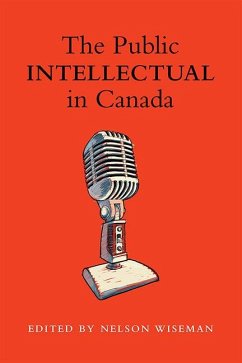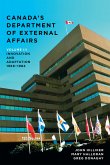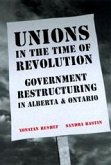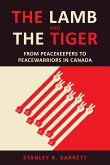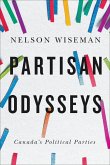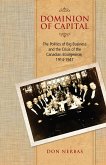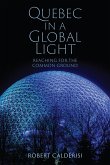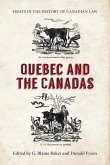Nelson Wiseman
The Public Intellectual in Canada
Nelson Wiseman
The Public Intellectual in Canada
- Gebundenes Buch
- Merkliste
- Auf die Merkliste
- Bewerten Bewerten
- Teilen
- Produkt teilen
- Produkterinnerung
- Produkterinnerung
Broad in scope and stylistically diverse, these essays offer a fascinating overview of the links between thought, public exposition, and action in the fields of politics, science, and culture.
Andere Kunden interessierten sich auch für
![Canada's Department of External Affairs, Volume 3 Canada's Department of External Affairs, Volume 3]() John HillikerCanada's Department of External Affairs, Volume 394,99 €
John HillikerCanada's Department of External Affairs, Volume 394,99 €![Unions in the Time of Revolutions Unions in the Time of Revolutions]() Sandra RastonUnions in the Time of Revolutions101,99 €
Sandra RastonUnions in the Time of Revolutions101,99 €![The Lamb and the Tiger The Lamb and the Tiger]() Stanley BarrettThe Lamb and the Tiger77,99 €
Stanley BarrettThe Lamb and the Tiger77,99 €![Partisan Odysseys Partisan Odysseys]() Nelson WisemanPartisan Odysseys83,99 €
Nelson WisemanPartisan Odysseys83,99 €![Dominion of Capital Dominion of Capital]() Don NerbasDominion of Capital100,99 €
Don NerbasDominion of Capital100,99 €![Quebec in a Global Light Quebec in a Global Light]() Robert CalderisiQuebec in a Global Light41,99 €
Robert CalderisiQuebec in a Global Light41,99 €![Essays in the History of Canadian Law, Volume XI Essays in the History of Canadian Law, Volume XI]() Essays in the History of Canadian Law, Volume XI120,99 €
Essays in the History of Canadian Law, Volume XI120,99 €-
-
-
Broad in scope and stylistically diverse, these essays offer a fascinating overview of the links between thought, public exposition, and action in the fields of politics, science, and culture.
Hinweis: Dieser Artikel kann nur an eine deutsche Lieferadresse ausgeliefert werden.
Hinweis: Dieser Artikel kann nur an eine deutsche Lieferadresse ausgeliefert werden.
Produktdetails
- Produktdetails
- Verlag: University of Toronto Press
- Seitenzahl: 264
- Erscheinungstermin: 22. Juli 2013
- Englisch
- Abmessung: 231mm x 155mm x 23mm
- Gewicht: 522g
- ISBN-13: 9781442645264
- ISBN-10: 1442645261
- Artikelnr.: 36956874
- Herstellerkennzeichnung
- Libri GmbH
- Europaallee 1
- 36244 Bad Hersfeld
- gpsr@libri.de
- Verlag: University of Toronto Press
- Seitenzahl: 264
- Erscheinungstermin: 22. Juli 2013
- Englisch
- Abmessung: 231mm x 155mm x 23mm
- Gewicht: 522g
- ISBN-13: 9781442645264
- ISBN-10: 1442645261
- Artikelnr.: 36956874
- Herstellerkennzeichnung
- Libri GmbH
- Europaallee 1
- 36244 Bad Hersfeld
- gpsr@libri.de
Edited by Nelson Wiseman
Introduction - Nelson Wiseman (University of Toronto)
Part I: What Are Public Intellectuals For?
1. The Public Intellectual and the Democratic Conversation - Janice
Gross Stein (University of Toronto)
2. The Public Intellectual and Politics: Why Choices Matter - Hugh Segal
(Chair of the Special Senate Committee on Anti-Terrorism)
3. 3. Public Thought and the Crisis of Underpopulation - Doug Saunders (
Globe and Mail’s European Bureau Chief)
4. What Are Intellectuals For? A Modest Proposal in Dialogue Form -
Mark Kingwell (University of Toronto)
Part II: Who Are They?
1. Public Intellectuals in Twentieth-Century Canada - Nelson Wiseman
2. Le Devoir, Forum for the Exchange of Ideas - Gregory Baum (University of
Toronto, McGill University)
3. Quebec Public Intellectuals in Times of Crisis - Alain-G. Gagnon
(Université du Québec à Montréal)
4. Navigating Gendered Spaces: Women as Public Intellectuals - Sylvia
Bashevkin (University of Toronto)
Part III: On the Front Lines
5. A Political Scientist in Public Affairs - Tom Flanagan (University of
Calgary)
6. Personal Success vs. Public Failure: The Muting of Canada's Academic
Intellectuals - Stephen Clarkson (University of Toronto)
7. Polling for Democracy - Michael Adams (Marketing Research and Intelligence
Association)
8. A People’s Intellectual - Maude Barlow (Council of Canadians, Blue Planet
Project)
9. Canadian Economists as Public Intellectuals - Pierre Fortin (Royal Society
of Canada, Canadian Institute for Advanced Research)
10. The Unbalanced Discussion of Aboriginal Policy - John Richards (Simon
Fraser University)
11. “Brave New Ethicists”: A Cautionary Tale - Margaret Somerville (McGill
Centre for Medicine, Ethics and Law)
Conclusion - Nelson Wiseman (University of Toronto)
Contributors
Part I: What Are Public Intellectuals For?
1. The Public Intellectual and the Democratic Conversation - Janice
Gross Stein (University of Toronto)
2. The Public Intellectual and Politics: Why Choices Matter - Hugh Segal
(Chair of the Special Senate Committee on Anti-Terrorism)
3. 3. Public Thought and the Crisis of Underpopulation - Doug Saunders (
Globe and Mail’s European Bureau Chief)
4. What Are Intellectuals For? A Modest Proposal in Dialogue Form -
Mark Kingwell (University of Toronto)
Part II: Who Are They?
1. Public Intellectuals in Twentieth-Century Canada - Nelson Wiseman
2. Le Devoir, Forum for the Exchange of Ideas - Gregory Baum (University of
Toronto, McGill University)
3. Quebec Public Intellectuals in Times of Crisis - Alain-G. Gagnon
(Université du Québec à Montréal)
4. Navigating Gendered Spaces: Women as Public Intellectuals - Sylvia
Bashevkin (University of Toronto)
Part III: On the Front Lines
5. A Political Scientist in Public Affairs - Tom Flanagan (University of
Calgary)
6. Personal Success vs. Public Failure: The Muting of Canada's Academic
Intellectuals - Stephen Clarkson (University of Toronto)
7. Polling for Democracy - Michael Adams (Marketing Research and Intelligence
Association)
8. A People’s Intellectual - Maude Barlow (Council of Canadians, Blue Planet
Project)
9. Canadian Economists as Public Intellectuals - Pierre Fortin (Royal Society
of Canada, Canadian Institute for Advanced Research)
10. The Unbalanced Discussion of Aboriginal Policy - John Richards (Simon
Fraser University)
11. “Brave New Ethicists”: A Cautionary Tale - Margaret Somerville (McGill
Centre for Medicine, Ethics and Law)
Conclusion - Nelson Wiseman (University of Toronto)
Contributors
Introduction - Nelson Wiseman (University of Toronto)
Part I: What Are Public Intellectuals For?
1. The Public Intellectual and the Democratic Conversation - Janice
Gross Stein (University of Toronto)
2. The Public Intellectual and Politics: Why Choices Matter - Hugh Segal
(Chair of the Special Senate Committee on Anti-Terrorism)
3. 3. Public Thought and the Crisis of Underpopulation - Doug Saunders (
Globe and Mail’s European Bureau Chief)
4. What Are Intellectuals For? A Modest Proposal in Dialogue Form -
Mark Kingwell (University of Toronto)
Part II: Who Are They?
1. Public Intellectuals in Twentieth-Century Canada - Nelson Wiseman
2. Le Devoir, Forum for the Exchange of Ideas - Gregory Baum (University of
Toronto, McGill University)
3. Quebec Public Intellectuals in Times of Crisis - Alain-G. Gagnon
(Université du Québec à Montréal)
4. Navigating Gendered Spaces: Women as Public Intellectuals - Sylvia
Bashevkin (University of Toronto)
Part III: On the Front Lines
5. A Political Scientist in Public Affairs - Tom Flanagan (University of
Calgary)
6. Personal Success vs. Public Failure: The Muting of Canada's Academic
Intellectuals - Stephen Clarkson (University of Toronto)
7. Polling for Democracy - Michael Adams (Marketing Research and Intelligence
Association)
8. A People’s Intellectual - Maude Barlow (Council of Canadians, Blue Planet
Project)
9. Canadian Economists as Public Intellectuals - Pierre Fortin (Royal Society
of Canada, Canadian Institute for Advanced Research)
10. The Unbalanced Discussion of Aboriginal Policy - John Richards (Simon
Fraser University)
11. “Brave New Ethicists”: A Cautionary Tale - Margaret Somerville (McGill
Centre for Medicine, Ethics and Law)
Conclusion - Nelson Wiseman (University of Toronto)
Contributors
Part I: What Are Public Intellectuals For?
1. The Public Intellectual and the Democratic Conversation - Janice
Gross Stein (University of Toronto)
2. The Public Intellectual and Politics: Why Choices Matter - Hugh Segal
(Chair of the Special Senate Committee on Anti-Terrorism)
3. 3. Public Thought and the Crisis of Underpopulation - Doug Saunders (
Globe and Mail’s European Bureau Chief)
4. What Are Intellectuals For? A Modest Proposal in Dialogue Form -
Mark Kingwell (University of Toronto)
Part II: Who Are They?
1. Public Intellectuals in Twentieth-Century Canada - Nelson Wiseman
2. Le Devoir, Forum for the Exchange of Ideas - Gregory Baum (University of
Toronto, McGill University)
3. Quebec Public Intellectuals in Times of Crisis - Alain-G. Gagnon
(Université du Québec à Montréal)
4. Navigating Gendered Spaces: Women as Public Intellectuals - Sylvia
Bashevkin (University of Toronto)
Part III: On the Front Lines
5. A Political Scientist in Public Affairs - Tom Flanagan (University of
Calgary)
6. Personal Success vs. Public Failure: The Muting of Canada's Academic
Intellectuals - Stephen Clarkson (University of Toronto)
7. Polling for Democracy - Michael Adams (Marketing Research and Intelligence
Association)
8. A People’s Intellectual - Maude Barlow (Council of Canadians, Blue Planet
Project)
9. Canadian Economists as Public Intellectuals - Pierre Fortin (Royal Society
of Canada, Canadian Institute for Advanced Research)
10. The Unbalanced Discussion of Aboriginal Policy - John Richards (Simon
Fraser University)
11. “Brave New Ethicists”: A Cautionary Tale - Margaret Somerville (McGill
Centre for Medicine, Ethics and Law)
Conclusion - Nelson Wiseman (University of Toronto)
Contributors

